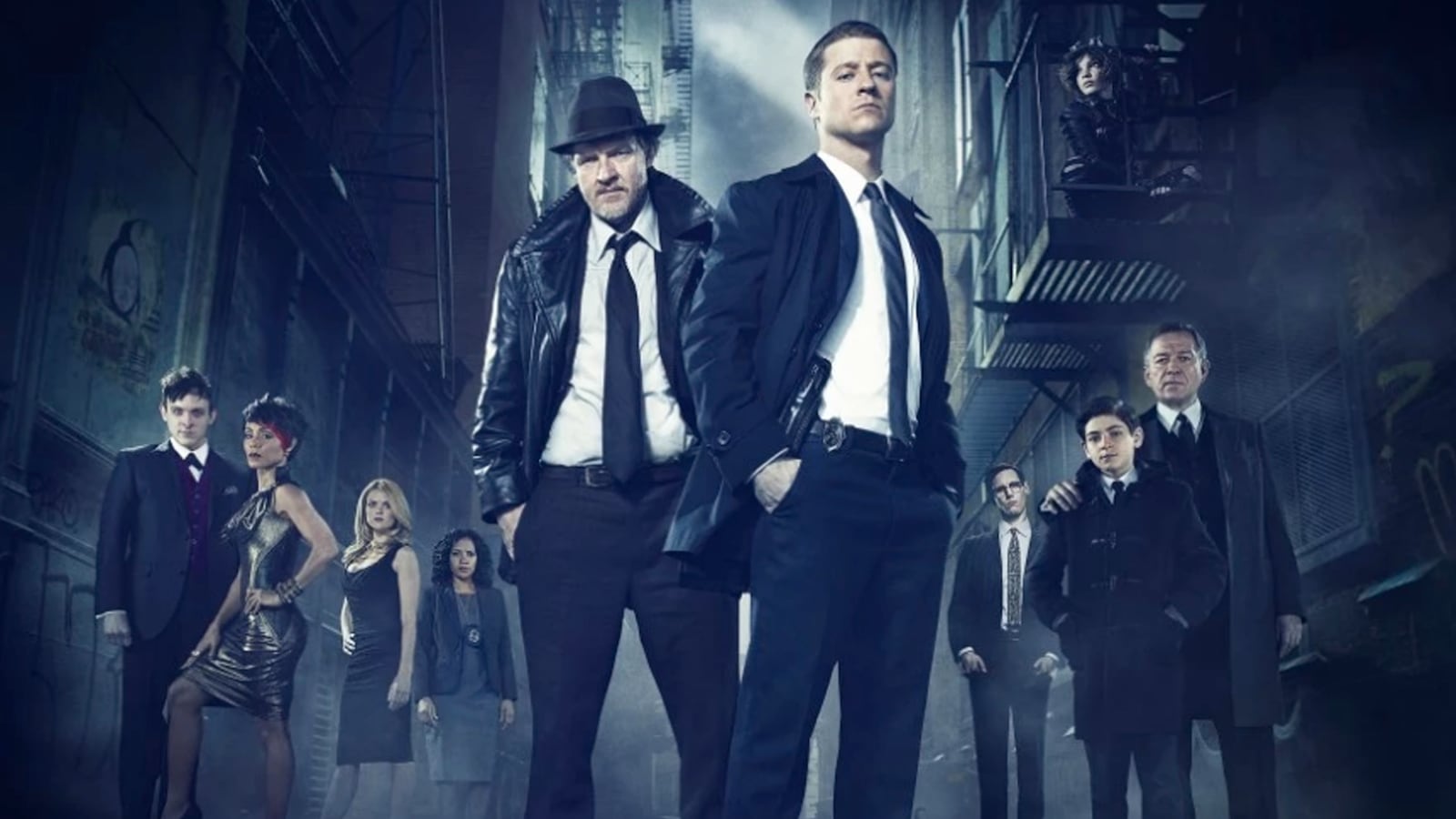Here’s an origin story: When I was a little fanboy, I watched the show Ghostwriter thinking it was Ghost Rider, Marvel’s flaming-skulled stunt biker who sold his soul to Satan. Years later—having watched episode after episode preaching reading and writing and no ass-kicking—I was told this wasn’t a superhero show.
My sad tale is a small illustration of just how incredibly starved comic-book readers were for live action in the ’90s. What did we have? Lois & Clark: The New Adventures of Superman. George Clooney and his frozen nipples in Batman & Robin. Teenage Mutant Ninja Turtles II: The Secret of the Ooze. Things were bad. But the “years later” is key to the telling of the story—the phrase skips over all the boring stuff.
That brings us to Gotham, Fox’s dramatic retelling of Batman’s adolescent years, which explores what happens after Bruce Wayne’s parents are murdered but before he becomes The Dark Knight. The answer, unfortunately, is not much.
Gotham is like a theater production of True Detective in the bloated universe of Game of Thrones, seen through the Instagram-filtered lens of Mad Men. And when the Batman story is stripped of the cape and cowl and light whizbang, what’s left is a mediocre and often cheesy cop drama.
At the heart of Gotham is Commissioner James Gordon, played here with Affleck-esque crew-cut stoicism by O.C. bad boy Ben McKenzie. He’s the kind of guy who can diffuse a hostage situation with brute force and street smarts. “I promise you, however dark and scary the world might be right now, there will be light,” he tells a sobbing Bruce at the crime scene.
But the show’s real star is Gotham City. It’s gritty and raw, yet scenes drip with color—graffiti on the walls, sunlight streaming through the windows of a dark diner, blood splashing from wounds—like an oversaturated comic-book panel.
The plot begins with an investigation into the Wayne killings and moves on to snitching, pearls, shiny shoes, and Jada Pinkett Smith as a mob boss named Fish Mooney, before eventually ending with Gordon and his partner being strung up in a meat locker.
Along the way we’re inundated with references to Batman, including villains (before they were infamous) from the caped crusader’s canon: Catwoman steals some milk and feeds a cat; Poison Ivy stands by plants; The Riddler says something about riddles; and The Penguin is teased for what appears to be having a sharp nose. And of course there’s tiny Bruce, who in one scene stands perilously close to the ledge of Wayne Manor’s roof.
“I’m learning to conquer fear,” he says.
“Fear doesn’t need conquering,” Gordon says. “Fear tells you where the edge is. Fear is a good thing.”
“And you think I haven’t told him that, do you?” Alfred interjects, to remind everyone that he exists.
We’ve seen scenes like this, heavy on the gravitas and light on the whizbang. In fact, most of this show feels like ground we’ve already covered.
It’s not all Gotham’s fault. A superhero’s origin story, especially a legendary one’s, is never that interesting. No one really wants to see how a good person grows into a good person in spandex who fights for justice. And in the age of comic-book blockbusters, we’ve seen these origin stories birthed on screen too many times. Batman, in his 75 years of existence, is one of the worst offenders.
The obvious exception to the tired origin story is 2001’s Smallville, a Superman-meets-Dawson’s Creek drama about the Man of Steel’s teen years. The show lasted for 10 years, buoyed by Michael’s Rosenbaum’s stellar work as Lex Luthor and creators Alfred Gough and Miles Millar’s ability to shatter the Superman mythology, then put the pieces together in an original way (like making Clark and Lex best friends). Hell, the show used dramatic pop songs to telegraph emotion, and it worked.
That’s not to say there isn’t enough in Batman’s backstory for solid TV. Frank Miller’s 1987 comic masterpiece Batman: Year One chronicled the parallel rise of Commissioner Gordon and Batman. Snippets of the story have appeared in countless cartoons, Val Kilmer’s Batman Forever, and Christopher Nolan’s Dark Knight films. It’s a shame Year One isn’t premiering on Fox this fall.
Of course, you can’t crucify a show for its pilot. Gotham may mature into a thrilling mystery that explores corrupt cops and the seedy underworld. And the not-so-subtle winks to Batman lore will be enough to satiate hungry fanboys for now. But while we know we’ll never see Batman, is Commissioner Gordon enough to save this Gotham? There seems to be a lot of furious storytelling, but to what end?
As we pour billions of dollars into movies like Guardians of the Galaxy, The Avengers: Age of Ultron, Batman v Superman: Dawn of Justice, and shows like Marvel’s Agents of S.H.I.E.L.D. and The Flash, maybe it’s foolish to critique a superhero television show, to hold it to the same standard as something like Breaking Bad. Maybe Gotham is the live-action superhero show we deserve, just not the one we need right now.






